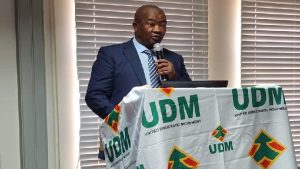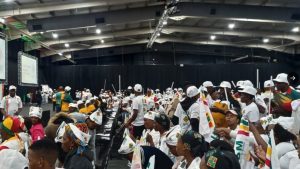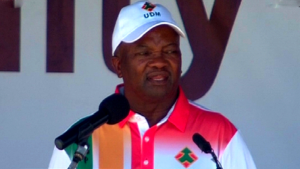The United Democratic Movement (UDM) is preparing for a comeback at the national and provincial elections. The party, one of the first breakaways from the African National Congress (ANC) during the early years of democracy, has been in decline since the early 2000s.
But now with the election manifesto it will be launching on 2 March at Midrand’s Gallager Conference Centre and its reputation for a zero-tolerance approach to corruption and promotion of good governance, the party is confident that it can win the support of a sizable number of South Africa’s 27. 6 million eligible voters.
The UDM was established in September 1997 by former ANC NEC member and Transkei homeland leader, General Bantu Holomisa and former National Party leader, Roelf Meyer. The party has been in the opposition benches for almost 27 years now.
But with this election said to be a turning point since the dawn of democracy, Holomisa is optimistic about the party’s growth prospect.
“The climate is conducive for us to grow the party given the frustrations which are in the open from the public point of view. There are acres and acres of space because the public is yearning for political parties that can bring solutions to the problems of the country.”
Decline in National Assembly seats
The UDM, however, has a lot of lost ground to cover. It has been in steady decline since 1999 when it held 14 seats in the National Assembly. 2004 saw it fall to nine seats, then to four seats in 2009 and 2014.
In 2019 the party garnered just two seats. Speaking at its National General Council in April last year UDM Deputy President Nqabayomzi Kwankwa said that the COVID-19 pandemic had exacerbated the party’s downward slide.
“We couldn’t organise on the ground and that created a situation where quite a number of our structures lapsed. We had to use the provision of some of the constitution to try to ensure that we extend the lifespan of some of the branches, that means that in some of the provinces where the UDM did not have great representation, suffered a great deal and we are now in the process of trying to ensure that we are represented in all provinces. ”
Working with other parties
At the same event Holomisa had proposed that opposition parties form a pact to contest the 2024 elections.
“Should there be consensus to form an alliance, interested stakeholders should establish an umbrella body where all partners should contest the 2024 elections under one banner without them losing their identities. In order to contest elections, the alliance’s umbrella body must be registered as a political party with the IEC. We must strive to be as inclusive as possible, and we should champion inclusivity, equality, and transparency.”
The party has, however, declined to be part of the Multiparty Charter citing its lack of inclusiveness of all opposition parties. The UDM prides itself on being a dependable and consistent champion for ordinary people.
It cites the advocacy it has done for pensioners from the former homeland states, retired teachers in the Eastern Cape seeking re-employment and needy the wastage of money to assist need students under NSFAS.
Speaking at the party’s 26th anniversary celebrations five months ago, Holomisa outlined what South Africans can expect from the party should it be given a chance to govern.
“Although we always call a spade, a spade, the UDM speaks in a positive language e.g., job creation, civil order, and clean governance, creating a world class nation and hope. And finally, this party of ours is still the champion of all communities, but we need to go back to our roots, learn from our mistakes and go into 2024, energised to transform South Africa into a Winning Nation.”
With the election date now out and the party set to hold its manifesto on Saturday, it hopes that its message will this time around resonate with the electorate.
IEC recently briefed the media on its preparations ahead of the elections:





